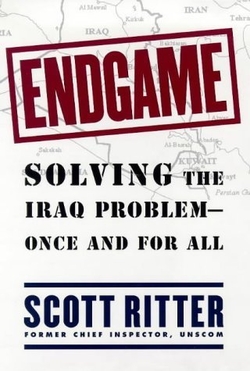 Scott Ritter, ex-marine, ex-arms inspector, is my kind of guy. He led the U.N.'s Concealment Investigation Unit to unearth Iraqi efforts to build weapons of mass destruction (WMD). He resigned last August from UNSCOM, the United Nations group tasked with defanging Iraq, in a blaze of glory, rightly protesting UNSCOM's lack of effectiveness and correctly declaring that "the illusion of arms control is more dangerous than no arms control at all."
Scott Ritter, ex-marine, ex-arms inspector, is my kind of guy. He led the U.N.'s Concealment Investigation Unit to unearth Iraqi efforts to build weapons of mass destruction (WMD). He resigned last August from UNSCOM, the United Nations group tasked with defanging Iraq, in a blaze of glory, rightly protesting UNSCOM's lack of effectiveness and correctly declaring that "the illusion of arms control is more dangerous than no arms control at all."
Now, I have to admit wondering just a bit when I read a New York Times page-one story in late February with the headline, "Ex-Inspector Cites Early Role of C.I.A. on U.N. Arms Teams." Why did Ritter go public with the spectacular (but totally unproven) claim that the Central Intelligence Agency had used UNSCOM in June 1996 as an instrument for gathering information to target Saddam Husayn for assassination? Still, I put doubts aside and picked up his book, Endgame, with happy anticipation.
I was not disappointed, at least not for many pages. In a well-organized and well-written account, Ritter makes his quite specific purpose clear right at the start: to establish the correct policy for stopping Saddam Hussein. He builds toward this goal with three steps.
First, he tells the story of what he calls the one Iraqi constant since 1988 - the ceaseless quest to build weapons of mass destruction. In the process, Ritter reliably presents a history of Iraqi high politics over the past decade, covering such diverse subjects as Saddam Husayn's family schisms and the Iraqi security organizations. Though not a specialist on Iraq, he gained true expertise on the subject (in part by relying on Amatzia Baram, the Israel scholar of whom it is said that no two camels can meet in the Iraqi desert without his being informed).
Second, Endgame recounts Ritter's personal experiences and memories during his many years on the UNSCOM team. He actually reveals a good deal of insider information - headline stuff like the CIA infiltration of UNSCOM as well as details about Russian-Iraqi collusion and what defectors told UNSCOM. To take one example, a formerly very highly placed Iraqi defector implausibly quoted Saddam right after losing the Kuwait war as saying, "We are finished, sonny boy." He also describes in compelling detail about being a distinctly unwelcome guest in a totalitarian states - the shouts, the eggs, even the cocked rifles.
Third, Ritter critiques the Clinton Administration for a "shallow understanding" of the obstacles to disarming Iraq and its "appalling lack of leadership." He faults the administration for its "uninspired no-endgame strategy of containment through economic sanctions of indefinite duration." Translated from jargon, he means that Washington has wrongly settled on economic restrictions against Iraq as a permanent measure, under the illusion that these in themselves will fell the regime.
Ritter objects to sanctions on several grounds: (1) They don't work, for Saddam is sacrificing his people's welfare rather than bend to American demands. (2) They lead to terrible casualty rates (Ritter finds the sanctions responsible each year for 43,000 dead Iraqis under the age of five) and inspire worldwide sympathy for the regime. (3) They cause the U.S. government to forfeit moral high ground and political advantage. (4) They render Washington reactive, for containment is inherently a passive approach, permitting key decisions to be made elsewhere. (5) They cannot last, for nearly the whole world objects to them.
These preliminaries done, Ritter finally offers his own ideas for "solving the Iraq problem - once and for all," as his subtitle puts it. He sketches out two alternatives to the present policy of containment, one military and the other diplomatic. The military option revives the "Road to Baghdad" plan of 1991: send 250,000 American soldiers to the Persian Gulf, overthrow the Saddam regime, and rebuild Iraq in our image (such as was done in Germany or Japan). Ritter foresees no military difficulties ahead (indeed, he expects American soldiers will spend "more time processing prisoners than fighting the forces of Saddam").
Ritter then thinks out the diplomatic option, suggesting the irreducible elements of a U.S.-Iraqi deal, namely: Saddam recognizes Kuwait, forswears weapons of mass destruction, gives the Kurds autonomy, ends the state of war with Israel, and works things out with the Iraqi opposition forces. In return, the U.S. government ends economic sanctions, funds the reconstruction of Iraq, rebuilds the Iraqi military, and permits peaceful nuclear research.
I'm still with the author, but just barely. For reasons I cannot fathom, he has artificially set up two extreme options - overthrowing Saddam or becoming his patron - and ignored everything in between. Of course, he will dismiss the latter option as wildly wrongheaded. ... But no, he doesn't. Instead, he despairs of the military option. He says it's not feasible because U.S. policy has so badly undermined the moral and legal cause against Iraq that the conflict has irretrievably eroded into a mere "squabble" between the two countries - and that's not enough to sustain the American populace in war. Even if it were enough, the "current U.S. policy of trying to overthrow Saddam is misguided," because Saddam is a symptom of underlying problems, not their cause. Most surprising of all is this utterly un-Marine-like sentence:
While doing business with Saddam is certainly not an attractive idea, when contrasted with the unspeakable horrors of war, or the mindless and morally corrupt policy of indefinite economic sanctions, it does present a lesser evil.
And so, with some regret but no doubts, Ritter concludes that a "bold diplomatic initiative, no matter how distasteful," is the only way to go.
These are, to put it mildly, astonishing statements. War with Saddam is worse than his continued rule? Economic sanctions are more horrible than his getting nukes?
Although this policy of capitulation would be regrettable coming from anyone, it is especially unfortunate coming from a person who reports from first-hand experience that "Iraq had lied [to UNSCOM] on every level." After experiencing the reality that "Iraq would go through the motions of disarmament, but not disarm," he now asks for more promises of WMD disarmament? Ritter wants the United States to train the Iraqi military in return for utterly meaningless assurances about recognizing Kuwait? Having learned that Iraq's "anti-terrorist school" was actually a school for terrorists, he wants the U.S. government now to pay for Iraqi economic development? In contrast to this, the much-reviled Clinton policy on Iraq looks positively brilliant.
In the end, Ritter cuts a highly erratic figure. He resigned from UNSCOM to protest its lack of effectiveness - then proceeded to do UNSCOM immeasurable harm with his revelations about CIA meddling. While vividly aware of the horrors Saddam has inflicted on the Iraqi people, from brutality to impoverishment, he nonetheless writes that they see the dictator "as a symbol of hope in their world of despair." He expresses revulsion at the Saddam regime but at one point (on learning about the CIA using UNSCOM to scout out information), he writes that he "began to understand the Iraqi point of view." He blasts the Clinton Administration for fecklessness, then proposes a far worse plan of appeasement.
When Scott Ritter addressed the Senate Foreign Relations Committee in September 1998, right after his resignation, Senator Joseph Biden (Democrat of Delaware) rudely accused him of acting "slightly beyond your pay grade and saying that Secretary of State Albright had more to consider than whether 'old Scottyboy' did or did not get access to a weapons site." While the senator's rudeness remains inexcusable, the full expression of Ritter's thinking makes it sadly clear that his gibe was exactly on target. This man should be dismantling weapons, not opining on foreign policy.
Feb. 22, 2004 update: The Boston Globe published a revealing interview with Scott Ritter today. Contrary to my final sentence above, he now works as a security consultant and volunteer firefighter in his hometown of Albany, N.Y. And his views have veered from appeasing to downright nutty, as summarized by this thought: "Iraq is worse off today without Saddam Hussein."
Apr. 12, 2004 update: For information on Scott Ritter's documentary, In Shifting Sands: The Truth About UNSCOM and the Disarming of Iraq, see my blog, "Saddam Hussein Made Me a Movie Star."
Jan. 15, 2010 update: More of what I called Ritter's "highly erratic" character came out today, with news that for the second time he is in trouble with the law for engaging in sexual exchanges with someone he thought to be a minor. The first time was in 2001.
Feb. 22, 2012 update: For an in-depth assessment of Ritter's character, politics, and troubles with the law, including his sentencing to jail for pedophilia, see Matt Bai, "Scott Ritter's Other War," in the New York Times Magazine.
Feb. 24, 2012 update: The Bai piece wrongly celebrates Ritter's views; Jacob Laskin dissects this mistake today at "Rehabilitating Scott Ritter."
Jan. 30, 2023 update: "Libertarian Party To Feature Child Sex Predator at Isolationist Rally" reads the Washington Free Beacon headline to a story on Ritter's further descent.
Feb. 4, 2023 update: Ritter tweeted the following:
I don't claim to be anti-war; never did. There are rabid dogs out there, and we need Atticus Finch's to shoot them.
I do, however, object to the senseless shooting of healthy dogs.
Ukraine is a rabid dog.
Russia is Atticus Finch.
Thus ends my lesson.
I don't claim to be anti-war; never did. There are rabid dogs out there, and we need Atticus Finch's to shoot them.
— Scott Ritter (@RealScottRitter) February 4, 2023
I do, however, object to the senseless shooting of healthy dogs.
Ukraine is a rabid dog.
Russia is Atticus Finch.
Thus ends my lesson. pic.twitter.com/C5KT17a4Eg
Dec. 16, 2023 update: More from Ritter:
Former UN weapons inspector & convicted sex offender who tried to meet an undercover police officer posing an an underaged girl and thinks Hamas' massacre was "legitimate" watched a 10 yr old video of the Egyptian army running over protestors and now thinks "Israel has to go" pic.twitter.com/vrPhgH1x5P
— Boaz Arad 博雅 (@aradboaz) December 17, 2023
Aug. 7, 2024 update: One day after his meeting with Robert F. Kennedy, Jr., the FBI raided Ritter's home in Delmar, NY in an "ongoing" investigation. Aug. 8, 2024 update: Ritter states that the search warrant is "related to a concern the U.S. government has about violation of the Foreign Agents Registration Act." Aug. 21, 2024 update: The New York Times reports that the search of Ritter's house is part of "a broad criminal investigation into Americans who have worked with Russia's state television networks, signaling an aggressive effort to combat the Kremlin's influence operations leading up to the presidential election in November."
 Ritter addressed an St. Petersburg International Economic Forum about Russophobia via video. |